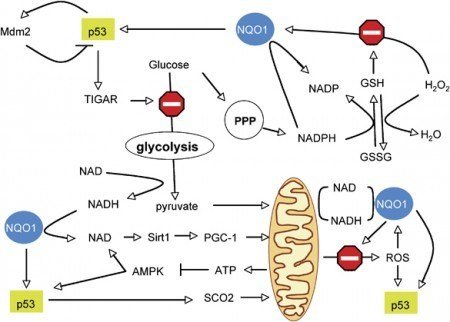
Too little NQO1 is almost a certain contributor to chemical sensitivity, lower energy, and sensitivity to supplements.
Are You…
- Sensitive to supplements?
- Sensitive to toxins?
- Have a biotoxin issue?
- Experiencing oxidative stress?
- Cancer?
If yes, then you need to read this post…
About NQO1 (NAD(P)H dehydrogenase (quinone 1))
NQO1 is an enzyme produced by the Nrf2 pathway that functions as an antioxidant, is important for detoxification and to increase NAD+ levels (1).
This protein’s enzymatic activity prevents the production of radical species and oxidative stress [1].
NQO1 helps with stresses such as from polyaromatic toxins and carcinogens, or by helping break down superoxides and peroxides. NQO1 directly scavenges superoxide [2].
NQO1 is employed in the removal of a quinone from biological systems as a detoxification reaction: NAD(P)H + a quinone → NAD(P) + hydroquinone [1].
Many of the hydroquinone products then get bound to glucuronides and sulfates and excreted [2].
NQO1 is concentrated in blood vessel tissue of mice, rats, and humans to deactivate toxins when they enter the bloodstream [1].
NQO1 is important in activating vitamin K to allow it to function well, which allows for blood clotting, bone health and also anti-tumor properties [1].
NQO1 changes ubiquinone to ubiquinol [1].
NQO1 increases the enzyme (Ornithine decarboxylase) for polyamine synthesis (like spermidine) [1]. Polyamines like spermidine are antiaging and healthful compounds.
Low levels of NQO1 has been associated with [1]:
- Many tumors – individuals with decreased NQO1 expression/activity have reduced p53 stability. Several anti-tumor agents such as mitosenes, indolequinones, aziridinyl benzoquinones, and β-lapachone have been designed be bioactivated by NQO1.
- Alzheimer’s disease
Since oxidative stress causes an inflammatory reaction, NQO1 ameliorates some animal models of autoimmune diseases [2].
Top Ways to Increase NQO1
First, you must read my NRF2 post, because this is what controls gene production [1, 3]. Anything that increases Nrf2 will increase NQO1.
Melatonin increases NOQ1 [4], so make sure your keeping to your circadian rhythm or supplement.
Beta Lapachone, found in Pau Darco, potentiates and increases NQO1 activity in animal models. This results in increased energy expenditure as measured by oxygen consumption and heat generation [5].
I notice an energy boosting effect from Pau Darco.
Oleanolic acid is a good way to increase NQO1 [6]. However, oleanolic acid supplements don’t contain enough of it or it’s not from a reliable company. I still take/have taken all of the ones I recommend.
Less NQO1 will result in less ubiquinol, so I recommend supplementing with that.
- Pau Darco. Pau Darco allows NQO1 to work better [3].
- Ubiquinol
- Oleanolic acid/Olive Leaf Extract
- Thyroid hormones [7] – make sure your thyroid hormones are up to par.
- Chlorogenic acid [8]
- Carnosic acid/Rosemary [9]
NQO1 Genes
If you want to interpret your genes, you can use SelfDecode.
SelfDecode is a sister company of SelfHacked. The proceeds from your purchase of this product are reinvested into our research and development, in order to serve you better. Thank you for your support.
